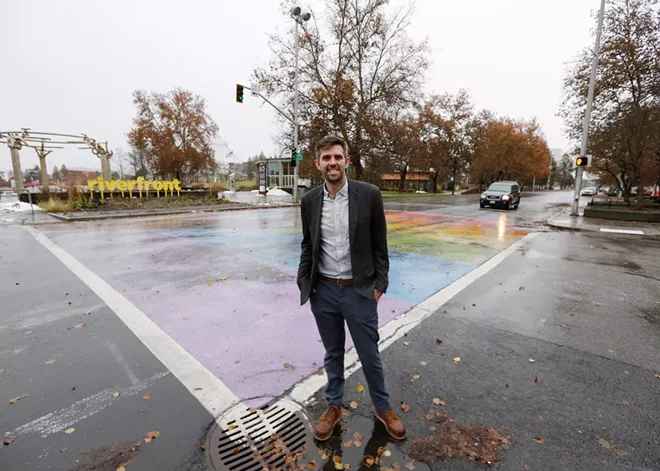Lawmakers in Idaho and Washington are worlds apart when it comes to issues affecting LGBTQ+ communities.
In the 2023 legislative session, Idaho lawmakers passed House Bill 71, which prevented transgender minors from accessing gender-affirming care including puberty blockers, hormone replacement therapy, and surgical interventions like mastectomies. The law also added a felony charge for the doctors who provided this care, with a sentence of up to 10 years in prison.
The law was set to go into effect on Jan. 1, but an ongoing legal challenge over the law's constitutionality has, so far, prevented it from being enforced.
Across the border, Washington legislators have already passed two bills in the state Senate that would strengthen hate crime laws in the state.
In October, vandals in Spokane threw paint over the city's two rainbow crosswalks — one on South Perry Street in front of Odyssey Youth Movement and the other on Spokane Falls Boulevard near Riverfront Park. However, what looked like a targeted attack toward Spokane's LGBTQ+ community couldn't be designated as a hate crime because the vandalism took place on public property. (Washington law currently doesn't consider the defacement of public property a hate crime.)
Because of this, Senate Majority Leader Andy Billig, D-Spokane, introduced Senate Bill 5917 to expand the definition of a hate crime to include bias-motivated defacement of private and public property.
SB 5917 passed through a 35-14 floor vote on Feb. 2, with just six Republican senators voting in favor of the bill.
State Sen. Mike Padden, R-Spokane Valley, opposed the bill, in part, because he thought it applied too broadly without a specified victim. He authored an amendment that would change specific wording like "another person's" to "the victim's" in the bill, essentially maintaining the current legal language.
"Opening up this statute so that the perpetrator's malicious and intentional crime does not need to be directed at a victim because of the victims perceived inclusion in a protected class is a very slippery slope and could enable some questionable cases," he said during a Jan. 25 committee hearing. "The ideal response to an unsolved crime is not to broaden the RCW in hope you catch the perpetrator the next time."
Padden's amendment did not receive enough support and was withdrawn.
Washington Senate Bill 5427 didn't make it out of last year's session but appears on track this year. The bill would establish a pilot reporting hotline for hate crimes in the attorney general's office by 2025 and then a final statewide hotline will need to be implemented by 2027. This would also require the attorney general's office to provide the data this hotline collects on an annual basis after implementation.
SB 5427 passed 30-18 in the Senate — largely along party lines. Sen. Ron Muzzall, R-Oak Harbor, was the sole Republican to vote in favor.
Both bills have already been referred to House committees, where public testimony will be heard later this week.
After Idaho legislators passed HB 71 into law, two anonymous teenagers currently receiving gender-affirming care in Idaho filed a lawsuit against Idaho Attorney General Raúl Labrador and Ada County Prosecuting Attorney Jan Bennetts, alleging that the bill violates the rights of transgender youth and their parents under the U.S. Constitution.
The plaintiffs argue that because the law is targeted solely toward transgender youth, it violates the 14th Amendment's Equal Protection Clause.
Under HB 71, cisgender youth (people whose gender identity matches the sex they were assigned at birth) would still be able to access these types of care as long as they weren't being used to "alter the appearance or affirm the child's perception of the child's biological sex."
Labrador argues that the bill doesn't discriminate based on someone's transgender status, however, due to its wording. Instead, he claims the bill's bans are meant to regulate "medical and surgical treatments for a particular psychiatric diagnosis," according to court documents.
The psychiatric diagnosis that this bill hinges upon is gender dysphoria — a mental disorder characterized by an incongruence between one's gender identity and their assigned sex.
While the case is still being heard in Idaho's District Court, a few key decisions have already been made.
Both Labrador and Bennetts tried to have the case dismissed, claiming that they weren't the proper parties to sue and that it was too early for litigation to begin since the lawsuit was filed before HB 71 took effect.
Labrador also tried to get the case dismissed by arguing that he's not the one who would be enforcing the law — that's up to the county prosecutors. Suing him, he argues, would be like suing the state, which is immune from that kind of lawsuit under the 11th amendment.
The court however, disagreed and denied both Labrador's and Bennetts' motions to dismiss.
The court also granted a preliminary injunction of the law, prohibiting any enforcement of HB 71 until all litigation in the case is completed.
Labrador made a motion to stay the injunction — basically pausing the pause on HB 71's enforcement — which was also denied by the district court. And later, the 9th U.S. Circuit Court of Appeals, where Labrador filed another emergency motion to stay the injunction, also denied his motion.
However, Labrador argued what appears to be the complete opposite point he made in his motion to dismiss the case, noting that the injunction is preventing him "from enforcing a law designed to protect vulnerable children."
On Wednesday, Feb. 7, Labrador filed his most recent emergency motion to the appeals court, claiming that "every day this blanket injunction remains in place, Idaho and its children suffer irreparable harm." ♦


























